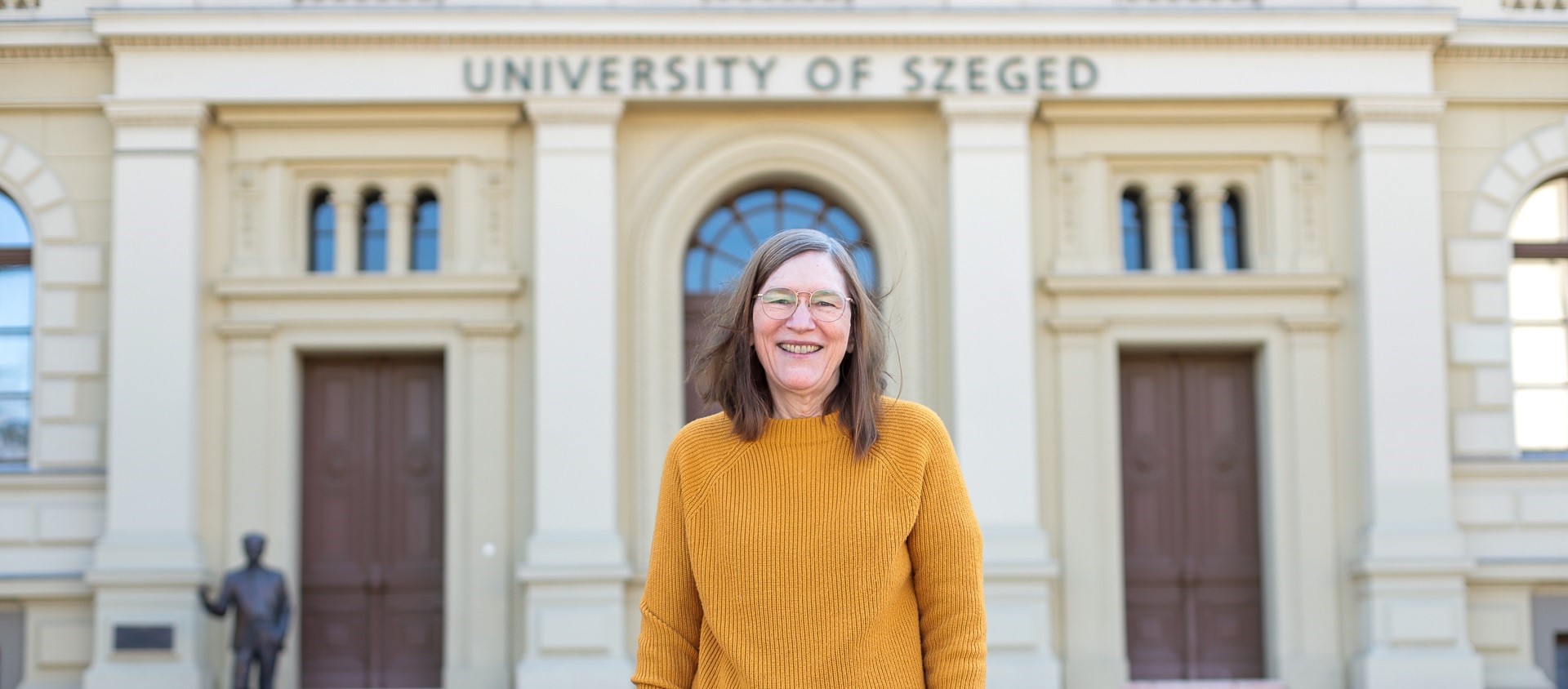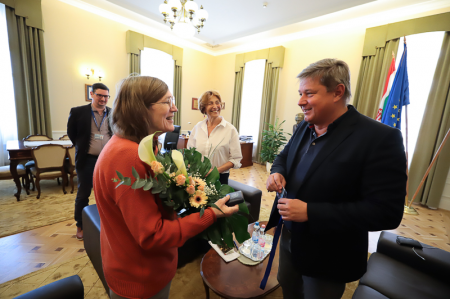
She met her husband at the South Pole, learned Russian in the army and struggled with math until high school. It was precisely because of her difficulties at school that she developed the learning method that is now used all over the world. Barbara Oakley, a lecturer at the University of Szeged, gave an extended interview to the Directorate for International and Public Relations of the University of Szeged.
OAKLEY AND THE UNIVERSITY OF SZEGED
Barbara Oakley, American professor of engineering - whose Coursera online course: Learning How to Learn is one of the most popular educational materials in the world - visited Hungary as a guest of the University of Szeged. The online course, which has attracted over 3 million people, provides unique advice on the methodology of learning. Professor Oakley has shared her work in bestselling books with millions of copies sold, as well as on the pages of The New York Times and The Wall Street Journal.
The relationship between the University of Szeged and Barbara Oakley dates back to 2019, when her online course Learning How to Learn was translated into Hungarian by the colleagues of the University of Szeged. Thus, Learning How to Learn, or „A tanulás tanulása” became the first Hungarian course on Coursera, chosen by more than 7,000 students so far. The course, which is part of the curriculum at the University of Szeged, is very popular among university students as it equips them with essential study skills.
During her visit to Hungary, Barbara Oakley gave lectures and workshops on online education and the methodology of learning and teaching to the students and colleagues of the University of Szeged and its partner universities within the EUGLOH European University Alliance. The world-renowned scientist gave an extended interview to the press office of the University of Szeged.
INTERVIEW
- What is the secret behind the popularity of your books and your course?
It has a number of different ingredients that all add together. First, we didn’t take the usual boring approach to teaching about learning, which is: 3 weeks of history of education, 3 more weeks on theories of education, 3 more weeks on how babies learn and a little tiny bit at the end about how people actually learn effectively, but nothing really much from neuroscience because it’s too complex. We flipped that on its head, and we started with the complexity of the brain and how you learn, but we use simple, fun metaphors to help people understand that these ideas are really not difficult and they’re practically useful. So when people take the course they get a lot of insight, and it’s insight they have often never heard before.
- What is the most important thing that you wanted to share with your readers, followers and the students of your course?
Don’t just follow your passion, broaden your passion! Everyone always tells you: follow your passion, and most people have the same passion, so that means when you get a career you’ve got the same training as most other people which makes it very difficult for you to differentiate yourself. If you also broaden your passion, picking up new interests, getting outside your comfort zone – in fact I like to say “grow comfortable with being uncomfortable” – this can help you to get new skillsets that are invaluable for a great career that can make for both a happy family and a happy you.
-What do you think the future of the education will look like?
It’s always difficult to predict what the future will bring, but I think that educators have a vested interest in keeping education pretty much the same, so it will advance very slowly. But I think there are fantastic new, helpful apps and other possibilities coming from artificial intelligence that will minimize the burden of reading for teachers and will allow students to practice more effectively and with a little bit more fun. I think these small apps will make a tremendous difference. Of course things will be moving more and more online, whether people like it or not. Students love to have good online courses! There will always continue to be face to face learning, but there will also be increased online learning. [It has many advantages, for example] you can stop your professor, and you can actually see more clearly sometimes what they’re trying to teach about. I think progress will be slow and incremental in some ways, but we will see more and more online learning and artificial intelligence apps that will be helpful for educators and students.
-You found your husband at the South Pole Station in Antarctica. Where did you find your methodology on learning?
My husband and I started global warming – I like to say that jokingly. When I graduated from high school I was terrible at math and science. I flunked my through the training. [After graduation] I enlisted in the army to learn a foreign language, and I spent a year and a half at the Defense Language Institute. (The language I chose was Russian – I obviously should have picked Hungarian.) That is one of the best language learning institutions in the world, and with their methodology I learned how to learn a language effectively. So when – at age 26 – I was getting out of the army, I decided to try to learn math and science and I used that same language learning methodology. I was successful.
-What are your impressions of the University of Szeged?
I visited hundreds and hundreds of universities around the world over the last decades and I think that the University of Szeged is by far the most innovative and visionary university I have ever been to. I am very deeply impressed by what I’ve seen here.

-What are your working on right now? What can the students of the University of Szeged and EUGLOH expect from you?
I wrote a book with my colleagues Beth Rogowsky és Terry Sejnowki called Uncommon Sense Teaching. Everybody thinks teaching is like common sense, except what it leads to is a lot of really bad teaching, because it turns out that common sense approach to teaching is sometimes antithetical to good learning. Now we’re making 3 courses for Coursera. I finished one, I’m just finishing the second. In fact this morning I was finalizing it, we only have 3 more videos out of the about 40 to go. This will be a specialization on great teaching. I will start working on the last [third] course which will be on teaching online.
OAKLEY'S PROGRAMME IN SZEGED
During her visit to Szeged, Barbara Oakley attended the international programme of the University of Szeged, where representatives of EUGLOH (alliance of five European universities, the University of Paris-Saclay in France, the University of Lund in Sweden, the University of Porto in Portugal, the Ludwig Maximilian University in Munich and the University of Szeged) gathered together between 5 and 8 April to discuss the harmonization of the association's processes related to university campuses. They were joined by representatives of Coursera, who talked about their experience on online education in Szeged. The students, lecturers and administrative staff could also participate in the Faculty of Economics and Business Administration’s international week, organized at the same time, making the first week of April really busy in the life of the University of Szeged.
SZTEinfo/ Ferenc Lévai
Photos: Anna Bobkó

